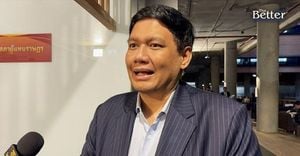The Independent Oversight Board for Meta expressed strong concerns on April 23, 2025, regarding the company's recent decision to terminate its partnerships with independent organizations specializing in fact-checking in the United States. This move, described by the board as "hasty" and lacking comprehensive assessments of human rights impacts, has sparked a debate about the implications for content moderation on platforms like Facebook, Instagram, and Threads.
Established in 2020, the Oversight Board was designed to review Meta's content decisions and ensure accountability. In its latest report, the board criticized Meta for failing to accompany its decision with any public information regarding evaluations that might assess the impact of these changes on human rights. The board's statement indicated that the absence of such evaluations raises significant concerns about the potential consequences of reduced oversight on marginalized communities.
In January 2025, Meta announced the cessation of its fact-checking services in the U.S., claiming that the previous oversight had led to excessive censorship. According to the company, "the more content is subject to oversight, the less likely it is to be impacted," which has drawn criticism from various human rights organizations. These groups warned that the changes could disproportionately affect vulnerable populations, particularly LGBTQ+ communities, by allowing harmful content to proliferate.
The board highlighted that instead of collaborating with specialized fact-checking organizations, Meta has implemented a new system called "contextual notes." This system allows users to add comments to posts that they believe require clarification or context, often linking to additional sources. However, studies cited by the board suggest that this system has only a limited effect in combating misinformation, prompting the board to recommend that Meta evaluate its effectiveness compared to traditional fact-checking methods.
In its report, the board emphasized the need for Meta to conduct a thorough assessment of the potential negative impacts of its decision on human rights and to adopt proactive measures to mitigate these effects, especially on communities most at risk from the spread of false information. The board's recommendations included enhancing the implementation of anti-bullying policies and clarifying the ideologies of hate speech prohibited on its platforms.
The board's critique of Meta's policy changes comes at a time when the company is attempting to navigate a complex political landscape. Meta's CEO, Mark Zuckerberg, is reportedly seeking to improve relations with political figures, including former President Donald Trump, while also facing scrutiny for the company's handling of controversial content. The Oversight Board's findings place Zuckerberg in a challenging position as he balances these relationships with the need to uphold the integrity of content moderation.
Meta's recent policy changes have raised questions about its commitment to addressing misinformation, particularly during sensitive political periods marked by increased manipulation of information. The board's report underscores the importance of maintaining robust fact-checking measures to protect public discourse and ensure the safety of users.
As Meta moves forward, the company has committed to responding to the board's 17 recommendations within 60 days. Among these recommendations is the suggestion to evaluate the effectiveness of community notes, which replace the partnerships with media outlets for fact-checking. The board has urged Meta to publish the results of its evaluations regularly to maintain transparency and accountability.
Despite the significant shift in oversight, Paulo Carozza, the co-chair of the Oversight Board, noted that Meta remains committed to collaborating with the board. "We do not see any sign that Meta wants to end or reduce cooperation with the board," Carozza stated. Meta has also pledged to fund the board until at least 2027, allocating a minimum of $35 million annually over the next three years to support its operations.
The ongoing dialogue between Meta and its Oversight Board highlights the complexities of content moderation in an era where misinformation can spread rapidly across social media platforms. As the board continues to monitor Meta's actions, the implications for human rights and the integrity of information shared online remain a critical concern for stakeholders globally.




